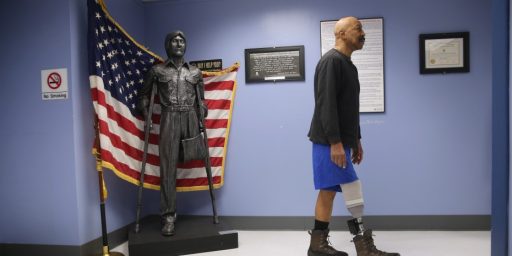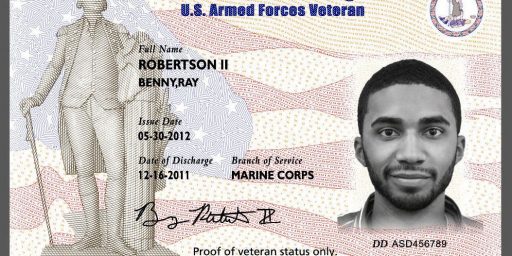All-Volunteer Force?
Andrew Exum [RSS], a former Army captain, is angry about current military personnel policies:
Many Americans, feeling that we did not have enough troops in Iraq, were pleased when the Defense Department announced last month that 20,000 more soldiers were being sent to put down the insurgency and help rebuild the country. Unfortunately, few realized that many of these soldiers would serve long after their contractual obligations to the active-duty military are complete. In essence, they will no longer be voluntarily serving their country.
These soldiers are falling victim to the military’s “stop-loss” policy — and as a former officer who led some of them in battle, I find their treatment shameful. Announced shortly after the 9/11 attacks and authorized by President Bush, the stop-loss policy allows commanders to hold soldiers past the date they are due to leave the service if their unit is scheduled to be deployed to Iraq or Afghanistan. Military officials rightly point out that stop-loss prevents a mass exodus of combat soldiers just before a combat tour.
But nonetheless, the stop-loss policy is wrong; it runs contrary to the concept of the volunteer military set up in the aftermath of the Vietnam War. Many if not most of the soldiers in this latest Iraq-bound wave are already veterans of several tours in Iraq and Afghanistan. They have honorably completed their active duty obligations. But like draftees, they have been conscripted to meet the additional needs in Iraq.
***
Secretary of Defense Donald Rumsfeld continues to claim that the military, as now structured, can meet the needs of the wars in Iraq and Afghanistan. He is simply wrong, as the Pentagon’s actions make clear. In addition to stop-loss, the military is now activating significant portions of the Individual Ready Reserve as part of what it is calling an “involuntary mobilization.”
The individual reserve consists of troops who are no longer expected to participate even in regular training; the idea is that they are to be called up only in a catastrophic national emergency. Most are veterans recently released from active duty; others are college students on scholarship and cadets at the service academies.
So several of my former soldiers now in the individual reserve — who have left the Army, begun new careers and have not even been serving in reserve or National Guard units — have now been told to expect orders to return to active duty in the near future.
Stop-loss and the activation of the inactive reserve show how politics has taken priority over readiness. The Pentagon uses these policies to meet its needs in Iraq because they are expedient and ask nothing of the civilian populace on the eve of a national election. This allows us to put off what is sure to be a difficult debate: whether our volunteer military is adequate to meet our foreign policy commitments. Meanwhile, in the absence of this debate, the men and women of our armed forces languish.
Last weekend, veterans of World War II were honored on the Mall in Washington for their sacrifices. Our government should begin treating the veterans of the global war on terrorism with a similar degree of respect, not as election-year fodder.
I sympathize with Exum’s frustration with these policies and, indeed, agree that they aren’t “fair.” Nonetheless, with very few exceptions, this is what soldiers sign up for in our “all-volunteer” force. When we signed the dotted line on our contracts and raised our hands to take the oath of office, we all agreed to eight years of service. Certainly, that fact isn’t emphasized, especially for enlisted volunteers who are sold on college benefits and other perks and the relatively short three or four years of active service that they initially bargained for. Still, it’s all there in the contract: eight years. The expectation is that the remaining obligation can be served out of uniform in the inactive reserve. In my case, that expectation was realized and my obligation fulfilled.
We now live in a different era. While 9/11 didn’t really change everything, it did change the nature of military service. We’re in a war, with no end in sight. As a result, the “needs of the service” kick in and individual plans to go back to school and otherwise get on with their lives are derailed. It’s frustrating and unfair. The military life often is. As Phil Carter notes, people make a single decision early in their life–to join–and hand over an inordinate amount of control for years to come. Again, I’m not sure this is “fair,” since it’s often made by people too young to legally purchase a beer–or even cigarettes–and made in total ignorance by people who have no real clue what the soldier’s life is all about, other than what they’ve seen in the movies, but such is life.
People make up things in their own mind and then assume that’s what the rule actually is. A case in point is the idea that the soldiers in the IRR are only available in “a catastrophic national emergency.” For that matter, many people seem to think the same is true for the Reserves and Guard in general. It’s just not true. Indeed, I’m not sure what would constitute “a catastrophic national emergency” for a global superpower. Would Pearl Harbor have qualified? How about 9/11?
Exum’s evoking of the WWII veterans here is quite amusing. Few of those men were professional soldiers who signed up ahead of time; most volunteered when the war started or were drafted. Some fought for three years in Europe only to be redeployed to finish off the war in the Pacific Theater. Many were called up again a few years later to fight in Korea. Mostly, they did it without whining about the disruption to their lives.




One of the great short novels written in the past 50 years is “The Bridges at Toko-Ri.”
One of the main themes of the novel is the recall of the veteran of World War II to fly again in Korea while others sit at home.
This book is the source of the oft quoted phrase, “Where do we get such men?”
If you haven’t read it, spend a Sunday afternoon with it.
Movie is good, too. Stars William Holden and Mickey Rooney as a CSAR helo pilot.
When I first joined the Army, one of the guys who processed in with me was a reservist who “neglected” to attend drills. He was called back to complete his (then) six-year obligation on active duty.
I had a platoon sergeant in Vietnam who was drafted near the end of WWII, then called back for Korea. He said that he finally decided to just stay in, since they kept calling him back.
One of Hal Moore’s complaints in “We Were Soldiers Once, and Young” was that he lost many of his best trained soldiers just before deploying to Vietnam because the government didn’t implement a stop-loss program.
The WWII soldiers were drafted for the “Duration plus six months”. That was at least partly in response to the repeated difficulties suffered by American forces from the Revolution through the Civil War as a result of the expiration of conscripts terms of service.
Your point about the obligation for eight years service being little recognized, but still an obligation, is spot on. I don’t know how many recruiters explain that part of the deal to prospects, but they should. Of course, if they do, they probably offer the caveat that “while it’s possible, it doesn’t happen very often…”
As someone who just spent a year in stop-loss status I am conflicted by it. It allows the military to retain critical people during national emergencies but it isn’t designed to be a long-term solution. The Army has implemented stop-loss/stop-move in various forms since September 11, 2001 and it appears almost to be the status-quo. That would be a negative. Some of the other results is the delay of military schools: from OAC to the NCO schools; delay of movements, these events destabilize the Army as a whole. Should there be more people? I don’t know.
Just so there’s no confusion of the facts: stop-loss is applied to soldiers with MORE than 8 years service, too.
—